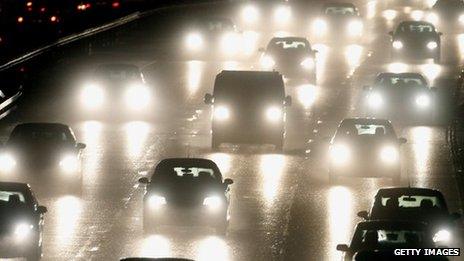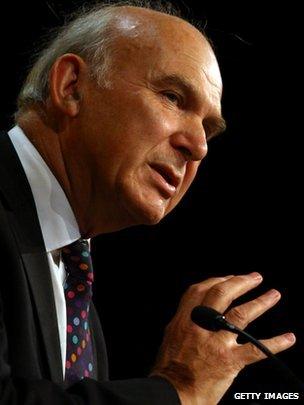Could congestion offer a road to economic growth?
- Published

More efficient use of existing roads may be preferable to building new ones
Traffic jams that waste time and money are a curse of modern life.
And concerns are growing that it could get much worse over the next two decades.
Road use is expected to grow 25-30% by 2030, according to government figures.
Which begs the question: what should the response be?
There are no simple answers to the question, but one thing is clear, according to business secretary Vince Cable: "The idea that we can build our way out of the problem is no longer credible."
The goal, therefore, will be to increase the capacity of the road network without increasing its physical footprint.
"We'll need to be more intelligent in managing the road network and the vehicles that use it," Mr Cable says.
'Intelligent mobility'
The idea will be to bring together the motor industry, the telecoms sector, electronics companies and others to create an "intelligent mobility industry", Mr Cable explains.
Its task would be to tackle congestion, enhance road safety, improve air quality and reduce carbon emissions.
Moreover, Mr Cable insists, this "convergence of technology and transport" should create jobs and growth and bolster the UK economy.
Golden opportunity?
Cars that communicate both with their drivers and passengers and with other vehicles will make up a cornerstone of intelligent mobility, according to former Ford executive Richard Parry-Jones, who co-chairs the UK's Automotive Council with Mr Cable.

Mr Cable says intelligent mobility could both solve problems and create economic growth
"Designing cars that intelligently navigate their way through traffic is the kind of challenge that calls on the country's combined auto heritage and budding technological expertise," he says.
"Networked vehicles under digital control are going to become the future of car manufacturing."
Consequently, the UK's transport challenges should not be seen merely in terms of the costs of a necessary transition.
Instead, it should be seen as an opportunity for Britain, Mr Cable insists.
"Intelligent mobility could benefit the economy, allowing businesses to be more competitive, reducing logistics costs, giving more predictable journey times and reducing carbon dioxide emissions," he says.
It could also provide a draw for foreign investors, adds Mr Parry-Jones, who believes it "represents a chance for the UK's auto industry to bring more research and development investment into the country".
In turn, the government and industry figures envisage a future where UK companies will become exporters of techniques and technologies to help similar transport challenges elsewhere in the world.
The eventual outcome, the Automotive Council predicts, could be the emergence of "an industry employing some 20,000 skilled workers and turning over some £5bn within a decade", on top of the economic benefits that would arise from better traffic flows.
Mr Cable is exited about the opportunities.
"What we're seeing," he says, "is the beginning of something that could become very, very important."